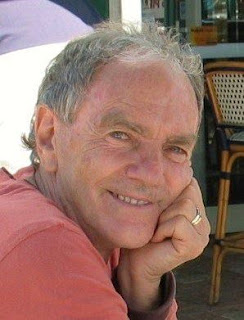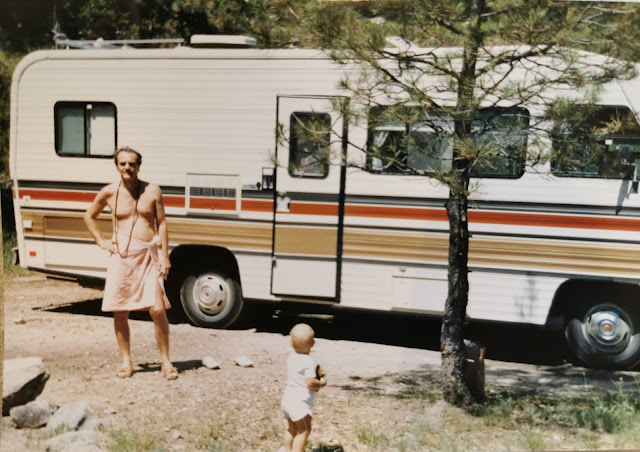Younger next year - addendum.
After publishing my post yesterday - Younger Next Year - I had some additional reflections on the importance of physical activity. I would like to share them in this post.
The research on, so called, "centenarians," i.e. people who lived until 100 and longer, clearly indicates that in most cases centenarians remained physically active late into their lives. They would often farm or grew their garden. Japanese study of the centenarians from Okinawa and Shimane regions also indicated other factors: simple diet, low stress lifestyle, caring community and sense of purpose as factors that kept Japanese centenarians alive.
Not to look too far, my own grandfather, Bronek, lived to 100. He worked hard all his life, including 30 years as locksmith in a mine. He was always happy to help his neighbors (as in this picture). I saw with my own eyes like, in his late 60s, Grandpa grabbed two buckets of mortar and carried them up on a wobbly board, when he was helping my uncle to build his house. Being always cheerful, he was very liked in the community. He used to play violin and was often asked to play during weddings, etc.
After retiring, Bronek remained active, organizing excursions for the seniors in his community. He never smoked and very seldom had any alcohol. His diet was simple, but, surprisingly, full of fats. Perhaps he was compensating for the time of the war when, in his report, they were at the verge of starvation most of the time.
 Importantly, he had a very positive life philosophy, which he expressed in the motto: "Your head up and smile!" It was this philosophy that allowed him to survive many hardships. He died peacefully in 2002, surrounded by loving family.
Importantly, he had a very positive life philosophy, which he expressed in the motto: "Your head up and smile!" It was this philosophy that allowed him to survive many hardships. He died peacefully in 2002, surrounded by loving family.
Another inspiration for me is my friend, Andrzej. Roughly 10 years older, Andrzej, "for years," has been spending one hour a day on his treadmill. He seems to be a perfect example of implementation of Henry Lodge's method. Andrzej reports that he runs on his treadmill until sweat makes it hard for him to see. His exercise attire needs to be replaced every time as it is soaked in his sweat. I think he is a good candidate to improve Canadian statistics of centenarians.
Question is how to bring your heart to a desired rate (as in Lodge's method) if you ... cannot run? This is, unfortunately, the case with me. In 2002 I hurt my right foot in a climbing accident and running is no longer a possibility for me. I tried exercise bike but also encountered problems. If I push too hard, this causes pain and discomfort in my pelvis (and right foot). I get a bit of cardio from swimming, whenever I can, and from hiking in the mountains. This however takes place only a few times a year.
Some people maintain that you can get a bit of cardio from sauna (heat forcing us to breathe harder) and from a bit of alcohol, which forces our hearts to work harder. There are some anecdotal data about people living into advanced age, who would have "a shot of cognac" every day. What do you think?
And, naturally, there is ... sex, which, some claim, is "the best exercise." But this deserves a separate blog post! :-)
(PR)
The research on, so called, "centenarians," i.e. people who lived until 100 and longer, clearly indicates that in most cases centenarians remained physically active late into their lives. They would often farm or grew their garden. Japanese study of the centenarians from Okinawa and Shimane regions also indicated other factors: simple diet, low stress lifestyle, caring community and sense of purpose as factors that kept Japanese centenarians alive.
Not to look too far, my own grandfather, Bronek, lived to 100. He worked hard all his life, including 30 years as locksmith in a mine. He was always happy to help his neighbors (as in this picture). I saw with my own eyes like, in his late 60s, Grandpa grabbed two buckets of mortar and carried them up on a wobbly board, when he was helping my uncle to build his house. Being always cheerful, he was very liked in the community. He used to play violin and was often asked to play during weddings, etc.
After retiring, Bronek remained active, organizing excursions for the seniors in his community. He never smoked and very seldom had any alcohol. His diet was simple, but, surprisingly, full of fats. Perhaps he was compensating for the time of the war when, in his report, they were at the verge of starvation most of the time.
 Importantly, he had a very positive life philosophy, which he expressed in the motto: "Your head up and smile!" It was this philosophy that allowed him to survive many hardships. He died peacefully in 2002, surrounded by loving family.
Importantly, he had a very positive life philosophy, which he expressed in the motto: "Your head up and smile!" It was this philosophy that allowed him to survive many hardships. He died peacefully in 2002, surrounded by loving family.Another inspiration for me is my friend, Andrzej. Roughly 10 years older, Andrzej, "for years," has been spending one hour a day on his treadmill. He seems to be a perfect example of implementation of Henry Lodge's method. Andrzej reports that he runs on his treadmill until sweat makes it hard for him to see. His exercise attire needs to be replaced every time as it is soaked in his sweat. I think he is a good candidate to improve Canadian statistics of centenarians.
Question is how to bring your heart to a desired rate (as in Lodge's method) if you ... cannot run? This is, unfortunately, the case with me. In 2002 I hurt my right foot in a climbing accident and running is no longer a possibility for me. I tried exercise bike but also encountered problems. If I push too hard, this causes pain and discomfort in my pelvis (and right foot). I get a bit of cardio from swimming, whenever I can, and from hiking in the mountains. This however takes place only a few times a year.
Some people maintain that you can get a bit of cardio from sauna (heat forcing us to breathe harder) and from a bit of alcohol, which forces our hearts to work harder. There are some anecdotal data about people living into advanced age, who would have "a shot of cognac" every day. What do you think?
And, naturally, there is ... sex, which, some claim, is "the best exercise." But this deserves a separate blog post! :-)
(PR)



Comments
Post a Comment